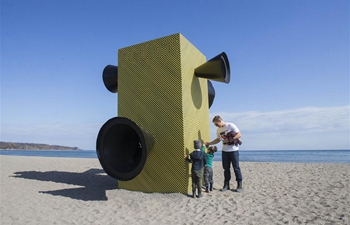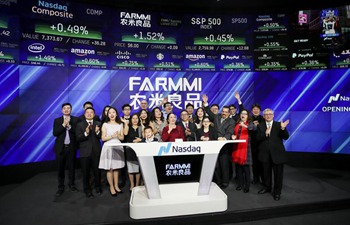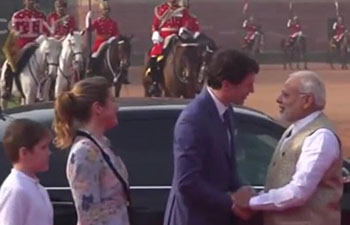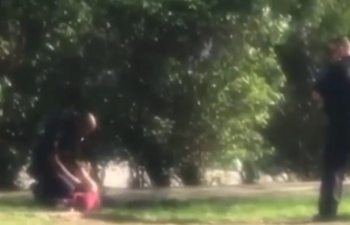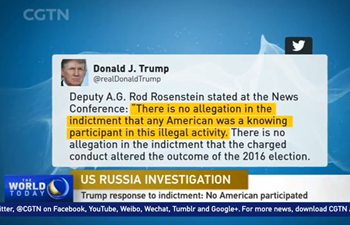by Peter Mertz
DENVER, the United States, Feb. 28 (Xinhua) -- Long before Vin Diesel and Paul Walker were thrilling international audiences with Fast and Furious, car races had been a deep-seated part of American culture.
And a race gaining international attention - to see which state will first put driverless cars on its roadways - is coming to a head with Utah, Arizona, and California neck and neck.
CALIFORNIA
California retook the lead Monday from Utah by announcing that by April 2 the public could start rolling down the freeway without a person in the driver's seat.
"Most likely you aren't going to see (public) permits right away...but we will see," said Jessica Gonzales, spokeswoman for California's Department of Motor Vehicles (DMV).
Gonzales told Xinhua Tuesday that test permits for driverless taxi companies like Uber and Lyft are likely to be issued first.
Last week, Utah's House Transportation Committee voted 10-0 to fully legalize driverless, autonomous vehicles anywhere on the state's roads with insurance backing, and full approval is expected in the next couple of weeks.
And in Arizona last month, officials gave Waymo the green light to order "thousands of vehicles" to run a self-driving transportation network company (TNC) in Phoenix using its Chrysler Pacifica minivans.
Many thought the Sunshine State would win the race when Governor Doug Ducey put driverless cars on the fast-track with an executive order in 2015, and after Ford, GM, and Google relocated their driverless operations into the state in 2016.
But that was before big, bad California flexed its muscles.
"California is car crazy, and with Silicon Valley leading the technology, it would be hard to see them play second fiddle to any in the auto industry, even Detroit," said H. Dudley Davidson, a Maryland car collector since 1976.
The new California DMV rules released this week are strict - with applicants required to show and explain remote control links and provide cyber attack and law enforcement action plans - and approval after a month-long vetting process that begins March 2.
"Take a look at 'The Love Bug,'" Davidson told Xinhua, about the 1968 Hollywood blockbuster featuring a semi-autonomous car named Herbie that wins a California race against all odds.
"Here we are 50 years later, and California is poised to put thousands of Herbies on the road by the end of the year. Only in California," Davidson said Tuesday.
But the race isn't over yet, and even Californians think upstart Utah and its tiny population of 3 million could win in the weeks ahead.
UTAH AND ARIZONA
"Utah will beat California, because, while both have high tech sectors, Utah has a more homogenous population and a Republican controlled state legislature that are on the same page," said San Francisco businessman Glenn Nemhauser.
Last week, Utah's sponsor, House Rep. Robert Spendlove, echoed the sentiments of political leaders in tech-savvy Arizona and California: "There is a great opportunity because of Utah's tech center to really take a lead in this area," he said in a statement.
With its 39 million people and notorious gridlocked urban roadways, California would benefit most from the new technology, Nemhauser told Xinhua, but has "a diverse population and strong city, county, and state governments with competing interests."
"So I give the nod to Utah to fill its empty streets with robot cars first," Nemhauser said Wednesday, and San Luis Obispo printing director John Ott agreed.
"Utah is the perfect state to lead the way," Ott told Xinhua. "It's wide open with a population less than the city of Los Angeles, to fully test the overall safety features before they end up on our streets."
Safety is a chief concern of the new push, and Consumer Watchdog hammered the new California regulations in a statement on Monday.
"A remote test operator will be allowed to monitor and attempt to control the robot car from afar," said John M. Simpson, the group's privacy project director. "It will be just like playing a video game, except lives will be at stake."
Since 2012, 21 states have passed legislation governing self-driving vehicles, and 33 states introduced legislation to be considered in 2017, according to the National Conference of State Legislatures.
Last year, industry insiders thought Arizona and its population of 7 million had the race locked and 4 million autonomous miles have been logged since then by test vehicles.
With the weight of the governor's office calling for immediate implementation, Arizona was in the driver's seat.
"It seems the governor is more interested in helping big businesses and not the average consumer or small businessman," Franklin Cardona, 29, a Phoenix resident and Uber driver, told Xinhua.
"Uber and Lyft drivers will soon be out of work here and in California if driverless cars take flight," Cardona noted.
CULTURE RACE
Another millennial pointed to a possible offshoot of the pending driverless era.
"My children may not even have driver's licenses, or be able to drive a car at all with the way the technology is exploding," offered Benjamin Brown, 25, a Hampshire College junior.
But for age-old car insiders like Davidson, cars are so deeply engrained in American culture that their relevance will never idle.
"Cars are a defining aspect of American culture - representing freedom and power, and mirroring America's rise to preeminence in the 20th century," Davidson said.
Davidson cites early Hollywood movies that featured cars as the foundation of the California car culture - that included "Bullitt (1968), American Graffiti (1973), and Cannonball Run, Smokey and the Bandit, and Back to the Future in the 1980s.
"From Henry Ford's assembly line in 1913 that could assemble a Model-T in 93 minutes, to Hollywood movies, to the racing sport itself - American culture resonates with the roar of the fuel combustion engine," Davidson said.
A 2014 Harris Poll revealed car racing (NASCAR) is more popular in America than the National Basketball Association (NBA) or the National Hockey league (NHL).
"The car is the star," a 2016 Atlantic article read. "That's been true for well over a century - unrivaled staying power for an industrial-age, pistons-and-brute-force machine in an era so dominated by silicon and software."
The post-WWII war boom produced a generation of teenagers with enough income to buy their own cars, the Atlantic piece stated.
"These were reflections of a lifestyle. The ability to tune and soup-up muscle cars gave average Joes the opportunity to show off their power, their speed and their style in a way that personified the car as character," Atlantic said.







